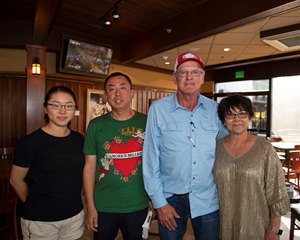LEG Forges Relationship With Chinese Horse Industry


Marking a positive step in international Thoroughbred trade opportunities, a handful of yearlings purchased at the Keeneland September Yearling Sale will become the first U.S.-bred horses specifically bought at auction to be exported for racing in mainland China.
Topped by a Temple City colt that was the highest-priced yearling during the Sept. 22 final session at $55,000, Jimmy and Martha Gladwell's LEG Group purchased five yearlings at Keenelandfive went through the ring for total receipts of $203,000. One additional yearling was acquired privately for an undisclosed price after it failed to sell. Consigned by Vinery Sales, agent for Haymarket Farm, the Temple City colt (Hip 4414) is the first foal out of the Yes It's True mare Amizzen Grace and hails from the family of grade 1 winner and sire Mizzen Mast .
LEG Group's purchases were made on behalf of Mr. Zhiqiang An, who was accompanied at the Keeneland sale by the Gladwells and Victoria Wang, a native of China who is the owner's bloodstock adviser and also serves as interpreter for An. Wang was enrolled in the Equine Industry Program at the University of Louisville and graduated from the Dubai International Internship, a program initiated by Sheikh Mohammed for Chinese students that was in place for five years.
While the China Horse Club has become a major buyer at U.S. auctions for its international stable, An's purchases at Keeneland are believed to be the first with the sole purpose of racing in mainland China. An, who has business interests in real estate, resides in Hohhot in Inner Mongolia and plans to spend more time and resources on his horse business and also helping cultivate a greater interest in racing in China. An said he has about 100 horses of various breeds, including Mongolian horses, in China and about 30 in Australia.
"There are a lot of big breeders of other breeds not Thoroughbreds, but now more local farmers are importing Thoroughbreds to cross breed some with local horses, and the number of Thoroughbred breeders is small but growing," said An, who had been to Keeneland previously but had never bought from the sale company until this year and was impressed by the number and quality of horses offered in September.
An said most imported horses competing in China have come from either Australia or New Zealand, although some have been brought in from Ireland, England, and France. Importation of U.S. horses has been limited due to a lack of knowledge among Chinese breeders about the opportunities and the higher costs of getting those horses into the country due to tariffs and other taxes, which previously added about 25% to the cost of a horse sent to China and now totals about 48%-50% as a result of the trade war between the two countries.
An said New Zealand has a free trade agreement with mainland China, so there are no tariffs; various taxes and other costs add about 13% to the cost of each horse. Australia does impose an 8% tariff, plus other taxes and fees.
The Gladwells, based near Ocala, Fla., said their interest in China began after Jimmy read in an industry publication that the country had ended its prohibition on U.S. horses being brought into the country. They formed LEG—Legacy Equine Group—for the purpose of working toward getting more U.S. horses to China. The LEG name stems from the involvement of the Gladwells' three children that would continue in the future.
With the assistance of a friend in Florida who was involved in construction and had done work in China, the Gladwells have made five trips to China, and on one of those excursions met An at a racetrack.
"We met and then continued to talk and we had lot of profound discussions on the future of racing in China and we both think America and China can work together on either the breeding side or racing side," Gladwell said. "They really want to get American-bred horses to China."
An said his interests in U.S.-breds stems from the similarities in racing in the two countries.
"There are a lot of advantages for American-bred horses to race in China because American horses are fast, mature, and strong and are good on dirt," An said. "In China, 95% of the races are on dirt or sand."
As he spends more time on his horse interests, An plans to try to persuade the Chinese government to help expand employment opportunities within the horse industry in Inner Mongolia, especially in regards to educating young people about the industry.
An and Gladwell believe there is greater potential for more Chinese investment in the Thoroughbred industry and exportation of U.S. horses to the country, but progress in that area would largely depend upon some relaxation of the current tariff structure. Along those lines, they are trying to get more Chinese owners to visit the U.S., a process that includes being invited to America as a precursor to applying for and obtaining a visa.
Gladwell has met with Kentucky Gov. Matt Bevin about his role in helping persuade President Trump to lower tariffs on horses and state government's help with the invitation and visa process.
An plans to bring several other people from China to the November sales, and Gladwell said Tim Ritvo and The Stronach Group have pledged support with invitations and visas for those wanting to attend the Breeders' Cup.
Long-term, Gladwell said he would like to see U.S. Thoroughbred organizations become involved in forging a relationship with Chinese breeders and owners.
"The wheels are in motion," Gladwell said. "This is ground-breaking for us."
